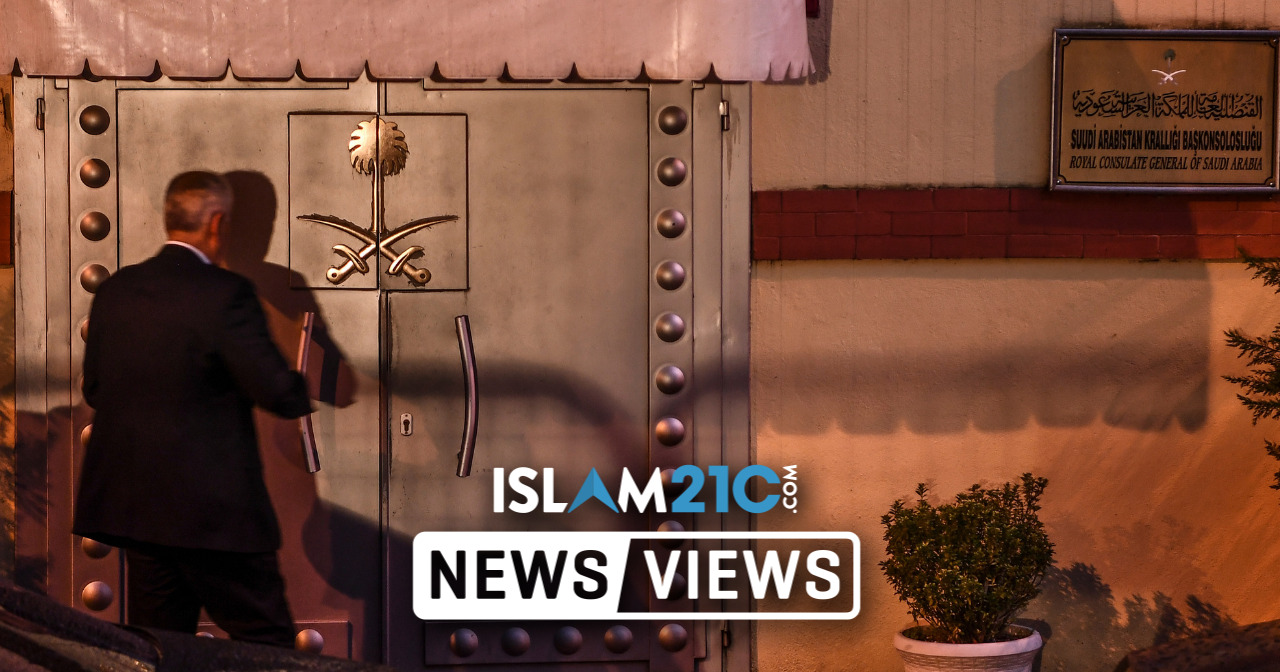Twenty Saudi nationals have gone on trial in absentia in Turkey for the brutal killing of Saudi author and journalist, Jamal Khashoggi (raḥimahu Allāhu). [1]
Khashoggi was inhumanely murdered in Saudi Arabia’s consulate in Istanbul. On 2nd October 2018, Khashoggi walked into the Saudi consulate in order to acquire documentation he needed to get married. The 59-year-old was never to be seen again. [2]
The prominent critic of Crown Prince Mohammed bin Salman (MBS), is said to have been killed by a team of Saudi agents on the orders of MBS.
The defendants include two former aides to the prince, who denies involvement. [3] The top Saudi officials include former deputy head of Saudi Arabia’s general intelligence Ahmed al-Asiri and former royal court adviser Saud al-Qahtani, who are accused of “premeditated murder with monstrous intent”.
Giving evidence on Friday, Zeki Demir, one of the Saudi consulate workers has told the court he was asked to light an oven less than an hour after Khashoggi entered the building.
The local technician said:
“There were five to six people there … They asked me to light up the tandoor [oven]. There was an air of panic,”
One theory police investigated was that the killers may have tried to dispose of Khashoggi’s body by burning it after suffocating him and cutting up his corpse into pieces, according to Turkish officials.
In his testimony, the consulate worker said that in addition to the oven in the consul’s garden he also saw many skewers of meat and a small barbecue.
The worker further added that the marble slabs around the oven seemed to have changed colour due to being cleaned with some sort of a chemical.
In the days following the disappearance of Khashoggi, the story developed almost every day since then, with Turkish media reporting on the 15-man “hit-squad” who arrived and departed Istanbul on the same day, and releasing horrific detail of what occurred to the critic of the Saudi rulers, including torture and dismemberment. His body was never recovered.
Following the murder, the official response from the Saudi authorities was to meet all accusations with blanket denial and refuse consulate access to Turkish investigators. Consulate access was eventually granted, albeit after areas of the consulate were said to have been repainted, and a deep clean of the site carried out.
Saudi officials, including those at the highest level in government, denied and berated all claims of his murder for the first 17 days after his disappearance, but on the 20th October, finally acknowledged that he had been killed.
Khashoggi, who left Saudi Arabia in 2017, was critical of the Saudi authorities and wrote articles criticising the government. In 2017, he wrote an article for The Washington Post, titled: “Saudi Arabia wasn’t always this repressive. Now it’s unbearable.”
The murder of the journalist prompted worldwide outrage and increased scrutiny of Saudi’s Crown Prince who denies being involved in the killing. According to several reports by the UN and other independent organisations, Khashoggi was very likely killed on orders of the Crown Prince.
In his articles, Khashoggi would express his concern and was critical of the policies of Saudi Crown Prince Mohammed bin Salman and the Saudi-led intervention in Yemen.
Although the Crown Prince continues to completely deny any involvement in the killing of the journalist, a UN expert has called for the royal to be investigated. In addition, in a report released last June, an expert described the killing as a “premeditated extrajudicial execution”.
The disappearance of Khashoggi came at a time where the Saudi authorities arrested scores of scholars and activists in what was seen as a significant shift in internal policy. The measures have been dubbed by some as a precursor to introducing more secular-leaning laws. [4]
Amongst the dozens of prominent scholars, activists and academics arrested by the Saudi authorities, are Sheikh Salman al-Awda, Sheikh Awad al-Qarni, Sheikh Mohammad Musa al-Sharif, Sheikh Muhammad Saleh al-Munajjid and Sheikh Abdul Aziz at-Tarefe. [5] Prosecutors in Saudi Arabia also sought the death penalty for some prominent scholars including, Shaykh Salman al-Ouda, following an apparent secret trial. [6]
[donationbanner]
Source: www.islam21c.com
Notes:
[1] https://www.bbc.co.uk/news/world-europe-53276121
[2] https://www.aljazeera.com/news/2019/09/year-jamal-khashoggi-murder-190930100740798.html
[3] https://www.dailysabah.com/politics/saudi-agents-stole-khashoggis-passport-to-force-him-to-visit-embassy-witness-says/news
[4] https://www.islam21c.com/news-views/founder-of-worlds-most-popular-islamic-website-sh-munajjid-detained-in-new-saudi-arrest-spree/
[5] https://www.islam21c.com/news-views/founder-of-worlds-most-popular-islamic-website-sh-munajjid-detained-in-new-saudi-arrest-spree/
[6] https://www.islam21c.com/news-views/saudi-prosecutor-seeks-death-penalty-for-scholar-salman-al-ouda/










There’s a lot of debate in the world currently around statues and monuments. Statues and monuments are significant to a nations culture and civilisation, it preserves identity, history, patriotism and in some cases it’s purely divine.
When Mahmod Ghazni conquered India he did something very controversial. He destroyed the largest Idol in the subcontinent against the wishes of the native people. The historians have noted that he arrived at the temple and the Idol was suspended in the air. The people we awe struck by its magnificence and splendour. After forming a consensus with his special advisers he ordered the wall of the side of the temple to be struck down. low and behold the Idol fell. It was not only an Idol but a vault full of treasure.
I’m against the school of smashing and tearing downs peoples country. I feel that education and museums are the right way to go forward and if the Idol is sacred enough it should stay.
Great courages people are the symbols of resistance and freedom. People like Shaheed Jamal Khashoggi and the “oppressed one” Julian Assange are the role models to be emulated and followed.
The muslim journalist never prostrates or bows to anyone except God. The duty is a covenant with God, To speak the truth, never fearing the blame of the blamer.
Our Islamic history is full of great personalities, men and women who made great sacrifices to uphold the balances and checks of society. The chosen people of God can never escape his surveillance.
A great man from the ummah of the prophet Mohammed(saw) once said,
“I warn you against shedding blood, indulging in it and making a habit of it, for blood never sleeps!”